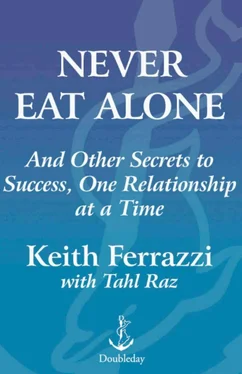Keith Ferrazzi - Never Eat Alone
Здесь есть возможность читать онлайн «Keith Ferrazzi - Never Eat Alone» весь текст электронной книги совершенно бесплатно (целиком полную версию без сокращений). В некоторых случаях можно слушать аудио, скачать через торрент в формате fb2 и присутствует краткое содержание. Год выпуска: 2005, ISBN: 2005, Издательство: C U R R E N C Y • D O U B L E D A Y, Жанр: marketing, на английском языке. Описание произведения, (предисловие) а так же отзывы посетителей доступны на портале библиотеки ЛибКат.
- Название:Never Eat Alone
- Автор:
- Издательство:C U R R E N C Y • D O U B L E D A Y
- Жанр:
- Год:2005
- ISBN:0-385-51529-4
- Рейтинг книги:4 / 5. Голосов: 1
-
Избранное:Добавить в избранное
- Отзывы:
-
Ваша оценка:
- 80
- 1
- 2
- 3
- 4
- 5
Never Eat Alone: краткое содержание, описание и аннотация
Предлагаем к чтению аннотацию, описание, краткое содержание или предисловие (зависит от того, что написал сам автор книги «Never Eat Alone»). Если вы не нашли необходимую информацию о книге — напишите в комментариях, мы постараемся отыскать её.
Never Eat Alone — читать онлайн бесплатно полную книгу (весь текст) целиком
Ниже представлен текст книги, разбитый по страницам. Система сохранения места последней прочитанной страницы, позволяет с удобством читать онлайн бесплатно книгу «Never Eat Alone», без необходимости каждый раз заново искать на чём Вы остановились. Поставьте закладку, и сможете в любой момент перейти на страницу, на которой закончили чтение.
Интервал:
Закладка:
What truly moves us as human beings, what prompts us into action, is emotion. Despite the odds, the Dalai Lama makes us believe that the seemingly impossible is, in fact, possible. In your own stories, use emotion to convince your doubters that underdogs sometimes win and Goliaths sometimes crumble.
Follow the example of this simple Buddhist monk who channels his charm and warmth into compelling stories that energize a diverse swath of people into action. In this new era of brands, in an economy that values emotions over numbers, storytellers will have the edge. As Michael Hattersley wrote in a Harvard Business Review article, "Too often, we make the mistake of thinking of business as a matter of pure rational calculation, something that in a few years computers will handle better than humans. One hears this in conference room and corridor: 'What do the numbers indicate?" Just give me the facts."Let's weigh the evidence and make the right decision.'And yet, truth to tell, few talents are more important to managerial success than knowing how to tell a good story."
So forget bullet points and slide shows. When you've figured out what your content is, tell an inspiring story that will propel your friends and associates into action with spirit and fearlessness, motivated and mobilized by your simple but profound storytelling.
23. Build Your Brand
Regardless of age, regardless of position, regardless of the business we happen to be in, all of us need to understand the importance of branding. We are CEOs of our own companies: Me Inc. To be in business today, our most important job is to be head marketer for the brand called You.
— TOM PETERSAs a marketing professional, I'm keenly aware that perception drives reality and that we are all, in some sense, brands. I know how all my choices—what I wear, my conversational style, my hobbies—fashion a distinctive identity.
Image and identity have become increasingly important in our new economic order. With the digital sea swelling in sameness and overwhelmed in information, a powerful brand—built not on a product but on a personal message—has become a competitive advantage.
Your content will become the guiding star of your brand, helping to integrate all your connecting efforts around a uniform and powerful mission. Good personal brands do three highly significant things for your network of contacts: They provide a credible, distinctive, and trustworthy identity. They project a compelling message. They attract more and more people to you and your cause, as you'll stand out in an increasing cluttered world. As a result, you will find it easier than ever to win new friends and have more of a say in what you do and where you work.
If I were to say, "Swoosh," what comes to mind? I'd be shocked if most people didn't respond, "Nike." After exposing consumers to the Nike swoosh for two decades, and infusing the symbol with all the athletic grandeur we now associate with the symbol, the company has trained us to think "Nike" whenever we see that simple little symbol.
Powerful stuff, don't you think?
Within a network, your brand can do something similar. It establishes your worth. It takes your mission and content and broadcasts it to the world. It articulates what you have to offer, why you're unique, and gives a distinct reason for others to connect with you.
Branding guru and all-star business consultant Tom Peters instructs in his customary bravado to "create your own microequivalent of the Nike swoosh." He wants to bring Madison Avenue to your cubicle, holding out the branding success of Michael Jordan and Oprah Winfrey as a template for every Willy Lohman wanting to become Willy Gates.
How have we gone from pitching products to pitching ourselves?
Peters insists that we live in a "World Turned Upside Down." The conventions of the past are meaningless. Rules are irrelevant. The lines have blurred between new and old economy, Hollywood, huge corporations, and simply huge incorporated individuals.
It's what Peters calls the "white-collar revolution." A confluence of factors—including a streamlining of business processes, technology that replaces jobs, an increase in outsourcing to foreign countries, and an age of entrepreneurialism where more and more people see themselves as free agents—are combining in such a way that Peters predicts over 90 percent of all white-collar jobs will be radically different or won't exist at all in ten to fifteen years. He says, "You must think of your job, your department, your division as a self-contained'Inc.'You must do WOW projects."
In terms of branding, then, the bottom line for everyone comes down to a choice: to be distinct or extinct.
"I'm sick to death of hearing, 'I'd like to, but they won't let me,'" Peters preaches, hitting his iconoclastic stride. "Be the CEO of your own life. Raise hell. Let the chips fall where they may. It'll never be easier to change jobs than it is today." Yes! Yes! Yes!
Few things infuriate me more than when people say they're helpless, or even indifferent, to distinguishing themselves from their peers and colleagues. I remember giving advice to an extremely smart young guy named Kevin, who was working at the consultancy PriceWaterhouseCoopers. In the course of our discussion, he told me he wasn't happy with what he was doing or how his career was playing out. He was, he told me, just another anonymous number cruncher with no alternatives given the staid environment there.
"Wrong!" I told him. "You have alternatives, you're just not creating them for yourself. You have to start taking ownership of managing your career. You have to start making an effort to change your brand from anonymous number cruncher to slightly famous difference maker."
When I made some suggestions on how he might go about doing this, he said, "That sort of thing can't be done at a big consulting company." I thought my head was going to explode. I think he probably thought so, too.
"Kevin, that's just self-defeating crap. From the first day I joined Deloitte—that's a pretty large consulting firm, right?—I went out of my way to take on projects no one wanted and initiated projects no one had thought of doing. I e-mailed my boss, and sometimes my boss's boss, ideas. And I did it almost every day. What was the worst thing that could happen? I'd get fired from a job I didn't like anyway. Alternatively, I'd make the effort to create the job—regardless of where it was—that I thought would make me happy."
FerrazziGreenlight's training-and-development division does a lot of training at professional schools and new-hire training for big companies. In our training, we try again and again to hammer home the message that your career is yours and yours alone to manage. Every job I've ever had, I've made an effort to brand myself as an innovator, a thinker, a salesman, and someone who could get stuff done. When I was just a management trainee at ICI, my first job out of college, I sent a set of recommendations to the CEO. So he never responded. But I never stopped sending those e-mails.
It's just silly to think you can't impact people's personal and professional expectations of who you are. By making the effort, you can break the glass ceiling by expanding people's view of your capability.
Peters tells his own story of an airline stewardess who suggested that her airline put one olive in their martinis rather than two. The suggestion went on to save the company over $40,000 a year and the stewardess was—instantly—branded. Today, she's probably a vice president.
The novelist Milan Kundera once reflected that flirting is the promise of sex with no guarantee. A successful brand, then, is the promise and guarantee of a mind-shattering experience each and every time. It's the e-mail you always read because of who it's from. It's the employee who always gets the cool projects.
Читать дальшеИнтервал:
Закладка:
Похожие книги на «Never Eat Alone»
Представляем Вашему вниманию похожие книги на «Never Eat Alone» списком для выбора. Мы отобрали схожую по названию и смыслу литературу в надежде предоставить читателям больше вариантов отыскать новые, интересные, ещё непрочитанные произведения.
Обсуждение, отзывы о книге «Never Eat Alone» и просто собственные мнения читателей. Оставьте ваши комментарии, напишите, что Вы думаете о произведении, его смысле или главных героях. Укажите что конкретно понравилось, а что нет, и почему Вы так считаете.












